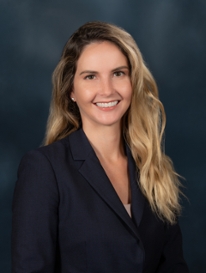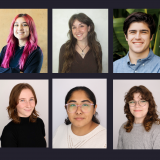
Dr. Kranjac Publishes Multiple Research Articles
October 5, 2021
Dr. Ashley Wendell Kranjac’s (Assistant Professor of Sociology) research seeks to understand scholarship in health inequalities, social stratification, and population studies. Dr. Kranjac investigates whether multifaceted determinants of risk persist after considering the sociodemographic characteristics of individuals and the neighborhoods in which they live. Her work has appeared in Pediatrics, Social Science & Medicine, Population & Environment, Maternal & Child Health, Journal of School Health, Population Research & Policy Review, Obesity Research & Clinical Practice, and Contexts.
 The Voice of Wilkinson sat down with Dr. Kranjac to ask her about her research.
The Voice of Wilkinson sat down with Dr. Kranjac to ask her about her research.
Voice of Wilkinson: You published an impressive six peer-reviewed articles in the 2020-21 academic year. How did you manage to publish so much in one year?
Ashley Kranjac: I work concurrently on multiple research projects, and each of these is typically in a different stage of development. As I’m writing up one study to submit for peer review, I am running analyses on another, while at the same time reviewing the literature to familiarize myself with a new topic.
VoW: Can you tell us more about the significant findings of your work?
AK: I published 2 papers on the COVID-19 pandemic. In Decomposing Differences in Coronavirus disease 2019-related Case-Fatality Rates across Seventeen Nations, we identified some underlying mechanisms that generate disparities in Covid-19-related mortality across the world. We show that community socioeconomic characteristics uniquely influence the incidence of confirmed coronavirus infections in New York City, one of the early epicenters of the COVID-19 pandemic in the United States in County-Level Factors That Influenced the Trajectory of COVID-19 Incidence in the New York City Area.
VoW: What other things did you publish on?
AK: Together with my collaborator from Temple University, I uncovered how the demographic processes generating social change in attitudes toward same-sex relationships changed over the last 45 years in the United States. We used data from the 1973 to 2018 General Social Survey and decomposition techniques to estimate the relative contributions of intracohort change and cohort replacement to overall social change [Attitudinal Change, Cohort Replacement, and the Liberalization of Attitudes about Same-sex Relationships, 1973–2018].
In another paper, with my collaborator at the University of La Verne, we identified overweight and obesity as putative mechanisms through which socioeconomic deprivation affects academic achievement [Child obesity moderates the association between poverty and academic achievement].
VoW: Tell us about your other two peer-reviewed articles.
AK: My colleagues at Rice University and I demonstrated that sex-specific complex dynamics underlie the influence of residential neighborhood context on child obesity [Neighborhoods matter; but for whom? Heterogeneity of neighborhood disadvantage on child obesity by sex].
Finally, using data from UC Irvine Medical Center Records, we provide a framework on how to integrate patient address data into the study of patient experience [Surgical Patients’ Hospital Experience Scores: Neighborhood Context Conceptual Framework].
VoW: How did you form connections with scholars outside of Chapman for your articles with multiple authors?
AK: I try to build and foster professional relationships in order to secure and maintain collaborations with colleagues across multiple institutions. Some of these relationships are here at Chapman University, others include Temple University, Rice University, the Children’s Hospital of Orange County, University of La Verne, and UCI’s medical school. This works well for me because my research is interdisciplinary in nature and encompasses biopsychosocial elements of health and well-being.
VoW: You also have been an active grant seeker and were awarded an internal Faculty Opportunity Fund grant. What advice do you have for other faculty to balance grant seeking, research, and publication?
AK: I apply for grants that align with my interdisciplinary research agenda to enhance my and my collaborators’ work on the causes and consequences of neighborhood population characteristics and socio-environmental exposures on health risks and disparities. Colleagues at Chapman University, like Allison DeVries, help me identify funding opportunities and provide guidance in applying for grants.

